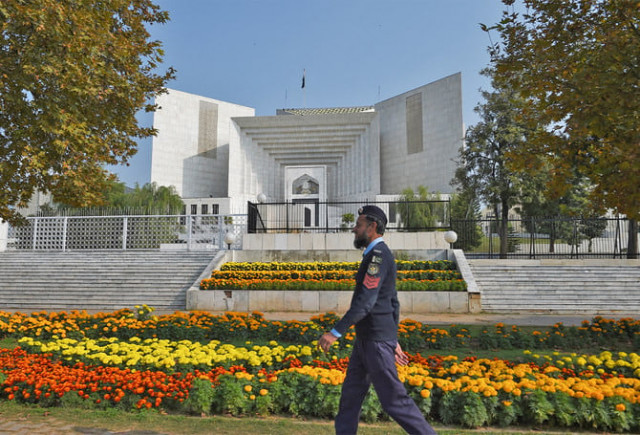Registrar cannot assume core adjudicatory role: SC
Powers to decide justifiability of legal questions raised in petitions ‘vested in the court’

Supreme Court Judge Justice Syed Mansoor Ali Shah has observed that the registrar office has no jurisdiction to decide the maintainability of a constitution petition, emphasising that the powers to decide the justifiability of legal and factual questions raised in petitions were vested in the court.
The observations came in an order that set aside legal objections to a petition filed against Pakistan Tehreek-e-Insaf (PTI) leaders, including Imran Khan, for “inciting the people against the country's institutions”.
The registrar had rejected the plea on the grounds that ingredients for invoking extraordinary jurisdiction of the SC under Article 184(3) of the Constitution were not satisfied.In a detailed judgement, Justice Shah noted there was no provision in the rules that empowered the registry to touch upon the matter, adding that a registrar enjoying administrative powers under the rules cannot assume the core adjudicatory role of the court under the Constitution.
He stressed the maintainability and the merits of a petition are justiciable issues, and fall within the domain of the court and added that the registrar is to perform certain functions that are mostly administrative and ministerial in nature.
In performing the administrative function of registration of petitions, appeals, suits and other matters under the relevant laws, the registrar has been conferred two powers, namely, the power “to require any plaint, petition of appeal, petition for leave to appeal or other matters” to be amended in accordance with the practice and procedure, and the power to “decline to receive any document” which is presented otherwise than in accordance with the rules.
The judgement further emphasised that the justifiability of the legal and factual questions raised in the petitions was a matter for the court to deal with and decide upon.
The order explained that there were certain miscellaneous matters, which are also essentially procedural in character, and wherein the registrar can exercise the powers of the court.
However, the matters listed particularly in sub-rules 1 to 31 did not authorise the registrar to decide upon the maintainability of a constitution petition filed under Article 184(3) of the Constitution.Therefore, the order overruled the impugned order of the registrar in which the objections – namely, (a), (c), (d) and (e) – touched upon the questions of maintainability and merits of the case which can only be examined by the court through a judicial determination and the administrative side."
As far as grounds (b) and (f) are concerned, they fall within the administrative powers exercised by the registrar and are found justified, therefore sustained. The appellant shall meet these objections, to the satisfaction of the Registrar, within two weeks. Once the needful is done, the office shall register the constitution petition of the appellant and fix it before an appropriate bench on the judicial side. The appeal is partly allowed in these terms,” the order said.
The objections which the apex court has overruled were concerning the petitioner’s invoking of extraordinary jurisdiction of the Supreme Court under Article 184(3) of the Constitution for the redressal of an individual grievance which, which the registrar had argued, was not permissible in terms of a judgment he cited."
The petitioner has not pointed out as to what questions of public importance in the instant case are involved with reference to enforcement of any of the fundamental rights guaranteed under the Constitution, so as to directly invoke jurisdiction of the Supreme Court under Article 184(3) of the Constitution,” the registrar had objected.
He had also pointed out that the petitioner had not approached any other appropriate forum available under the law for the same relief and had also not provided any justification for not doing so, therefore, the registrar concluded, the “ingredients for invoking extraordinary jurisdiction of this court under Article 184(3) of the Constitution have not been satisfied”.


1724319076-0/Untitled-design-(5)1724319076-0-208x130.webp)
















COMMENTS
Comments are moderated and generally will be posted if they are on-topic and not abusive.
For more information, please see our Comments FAQ